

SUBSCRIBE TO OUR FREE NEWSLETTER
Daily news & progressive opinion—funded by the people, not the corporations—delivered straight to your inbox.
5
#000000
#FFFFFF
To donate by check, phone, or other method, see our More Ways to Give page.


Daily news & progressive opinion—funded by the people, not the corporations—delivered straight to your inbox.

The combined foreign policy legacies of the current and previous president exemplify the destructive and destabilizing role the U.S. government, and the military it controls, have had on the world. (File)
The United States has been at war -- major boots-on-the-ground conflicts and minor interventions, firefights, air strikes, drone assassination campaigns, occupations, special ops raids, proxy conflicts, and covert actions -- nearly nonstop since the Vietnam War began. That's more than half a century of experience with war, American-style, and yet few in our world bother to draw the obvious conclusions.
Given the historical record, those conclusions should be staring us in the face. They are, however, the words that can't be said in a country committed to a military-first approach to the world, a continual build-up of its forces, an emphasis on pioneering work in the development and deployment of the latest destructive technology, and a repetitious cycling through styles of war from full-scale invasions and occupations to counterinsurgency, proxy wars, and back again.
So here are five straightforward lessons -- none acceptable in what passes for discussion and debate in this country -- that could be drawn from that last half century of every kind of American warfare:
And here's a bonus lesson: if as a polity we were to take these five no-brainers to heart and stop fighting endless wars, which drain us of national treasure, we would also have a long-term solution to the Veterans Administration health-care crisis. It's not the sort of thing said in our world, but the VA is in a crisis of financing and caregiving that, in the present context, cannot be solved, no matter whom you hire or fire. The only long-term solution would be to stop fighting losing wars that the American people will pay for decades into the future, as the cost in broken bodies and broken lives is translated into medical care and dumped on the VA.
"Think whatever you want about war and American war-making, but keep in mind that we are inside an enormous propaganda machine of militarism, even if we barely acknowledge the space in our lives that it fills."
Heroes and Turncoats
One caveat. Think whatever you want about war and American war-making, but keep in mind that we are inside an enormous propaganda machine of militarism, even if we barely acknowledge the space in our lives that it fills. Inside it, only certain opinions, certain thoughts, are acceptable, or even in some sense possible.
Take for an example the recent freeing of Sergeant Bowe Bergdahl from five years as a captive of the Haqqani network. Much controversy has surrounded it, in part because he was traded for five former Taliban officials long kept uncharged and untried on the American Devil's Island at Guantanamo Bay, Cuba. It has been suggested that Sgt. Bergdahl deserted his post and his unit in rural Afghanistan, simply walked away -- which for opponents of the deal and of President Obama makes the "trade for terrorists" all the more shameful. Our options when it comes to what we know of Bergdahl's actions are essentially to decry him as a "turncoat" or near-voluntary "terrorist prisoner" or ignore them, go into a "support the troops" mode, and hail him as a "hero" of the war. And yet there is a third option.
According to his father, in the period before he was captured, his emails home reflected growing disillusionment with the military. ("The U.S. army is the biggest joke the world has to laugh at. It is the army of liars, backstabbers, fools, and bullies. The few good SGTs [sergeants] are getting out as soon as they can, and they are telling us privates to do the same.") He had also evidently grown increasingly uncomfortable as well with the American war in that country. ("I am sorry for everything here. These people need help, yet what they get is the most conceited country in the world telling them that they are nothing and that they are stupid, that they have no idea how to live.") When he departed his base, he may even have left a note behind expressing such sentiments. He had reportedly told someone in his unit earlier, "If this deployment is lame... I'm just going to walk off into the mountains of Pakistan."
That's what we know. There is much that we don't know. However, what if, having concluded that the war was no favor to Afghans or Americans and he shouldn't participate in it, he had, however naively, walked away from it without his weapon and, as it turned out, not into freedom but directly into captivity? That Sgt. Bergdahl might have been neither a military-style hero, nor a turncoat, but someone who voted with his feet on the merits of war, American-style, in Afghanistan is not an option that can be discussed calmly here. Similarly, anyone who took such a position here, not just in terms of our disastrous almost 13-year Afghan War, but of American war-making generally, would be seen as another kind of turncoat. However Americans may feel about specific wars, walking away from war, American-style, and the U.S. military as it is presently configured is not a fit subject for conversation, nor an option to be considered.
It's been a commonplace of official opinion and polling data for some time that the American public is "exhausted" with our recent wars, but far too much can be read into that. Responding to such a mood, the president, his administration, and the Pentagon have been in a years-long process of "pivoting" from major wars and counterinsurgency campaigns to drone wars, special operations raids, and proxy wars across huge swaths of the planet (even while planning for future wars of a very different kind continues). But war itself and the U.S. military remain high on the American agenda. Military or militarized solutions continue to be the go-to response to global problems, the only question being: How much or how little? (In what passes for debate in this country, the president's opponents regularly label him and his administration "weak" for not doubling down on war, from the Ukraine and Syria to Afghanistan).
Meanwhile, investment in the military's future and its capacity to make war on a global scale remains staggeringly beyond that of any other power or combination of powers. No other country comes faintly close, not the Russians, nor the Chinese, nor the Europeans just now being encouraged to up their military game by President Obama who recently pledged a billion dollars to strengthen the U.S. military presence in Eastern Europe.
In such a context, to suggest the sweeping failure of the American military over these last decades without sapping support for the Pentagon and the military-industrial complex would involve making the most breathtaking stab-in-the-back argument in the historical record. This was tried after the Vietnam War, which engendered a vast antiwar movement at home. It was at least conceivable at the time to blame defeat on that movement, a "liberal" media, and lily-livered, micromanaging politicians. Even then, however, the stab-in-the-back version of the war never quite stuck and in all subsequent wars, support for the military among the political class and everywhere else has been so high, the obligatory need to "support the troops" -- left, right, and center -- so great that such an explanation would have been ludicrous.
A Record of Failure to Stagger the Imagination
The only option left was to ignore what should have been obvious to all. The result has been a record of failure that should stagger the imagination and remarkable silence on the subject. So let's run through these points one at a time.
1. American-style war doesn't work. Just ask yourself: Are there fewer terrorists or more in our world almost 13 years after the 9/11 attacks? Are al-Qaeda-like groups more or less common? Are they more or less well organized? Do they have more or less members? The answers to those questions are obvious: more, more, more, and more. In fact, according to a new RAND report, between 2010 and 2013 alone, jihadist groups grew by 58%, their fighters doubled, and their attacks nearly tripled.
On September 12, 2001, al-Qaeda was a relatively small organization with a few camps in arguably the most feudal and backward country on the planet, and tiny numbers of adherents scattered elsewhere around the world. Today, al-Qaeda-style outfits and jihadist groups control significant parts of Syria, Iraq, Pakistan, and even Yemen, and are thriving and spreading in parts of Africa as well.
Or try questions like these: Is Iraq a peaceful, liberated state allied with and under Washington's aegis, with "enduring camps" filled with U.S. troops on its territory? Or is it a riven, embattled, dilapidated country whose government is close to Iran and some of whose Sunni-dominated areas are under the control of a group that is more extreme than al-Qaeda? Is Afghanistan a peaceful, thriving, liberated land under the American aegis, or are Americans still fighting there almost 13 years later against the Taliban, an impossible-to-defeat minority movement it once destroyed and then, because it couldn't stop fighting the "war on terror," helped revive? Is Washington now supporting a weak, corrupt central government in a country that once again is planting record opium crops?
But let's not belabor the point. Who, except a few neocons still plunking for the glories of "the surge" in Iraq, would claim military victory for this country, even of a limited sort, anywhere at any time in this century?
2. American-style wars don't solve problems. In these years, you could argue that not a single U.S. military campaign or militarized act ordered by Washington solved a single problem anywhere. In fact, it's possible that just about every military move Washington has made only increased the burden of problems on this planet. To make the case, you don't even have to focus on the obvious like, for example, the way a special operations and drone campaign in Yemen has actually al-Qaeda-ized some of that country's rural areas. Take instead a rare Washington "success": the killing of Osama bin Laden in a special ops raid in Abbottabad, Pakistan. (And leave aside the way even that act was over-militarized: an unarmed Bin Laden was shot down in his Pakistani lair largely, it's plausible to assume, because officials in Washington feared what once would have been the American way -- putting him on trial in a U.S. civilian court for his crimes.) We now know that, in the hunt for bin Laden, the CIA launched a fake hepatitis B vaccinationproject. Though it proved of no use, once revealed it made local jihadists so nervous about medical health teams that they began killing groups of polio vaccination workers, an urge that has since spread to Boko Haram-controlled areas of Nigeria. In this way, according to Columbia University public health expert Leslie Roberts, "the distrust sowed by the sham campaign in Pakistan could conceivably postpone polio eradication for 20 years, leading to 100,000 more cases that might otherwise not have occurred." The CIA has since promised not to do it again, but too late -- and who at this point would believe the Agency anyway? This was, to say the least, an unanticipated consequence of the search for bin Laden, but blowback everywhere, invariably unexpected, has been a hallmark of American campaigns of all sorts.
Similarly, the NSA's surveillance regime, another form of global intervention by Washington, has -- experts are convinced -- done little ornothing to protect Americans from terror attacks. It has, however, done a great deal to damage the interests of America's tech corporations and to increase suspicion and anger over Washington's policies even among allies. And by the way, congratulations are due on one of the latest military moves of the Obama administration, the sending of U.S. military teamsand drones into Nigeria and neighboring countries to help rescue those girls kidnapped by the extremist group Boko Haram. The rescue was a remarkable success... oops, didn't happen (and we don't even know yet what the blowback will be).
3. American-style war is a destabilizing force. Just look at the effects of American war in the twenty-first century. It's clear, for instance, that the U.S. invasion of Iraq in 2003 unleashed a brutal, bloody, Sunni-Shiite civil war across the region (as well as the Arab Spring, one might argue). One result of that invasion and the subsequent occupation, as well as of the wars and civil wars that followed: the deaths of hundreds of thousands of Iraqis, Syrians, and Lebanese, while major areas of Syria and some parts of Iraq have fallen into the hands of armed supporters of al-Qaeda or, in one major case, a group that didn't find that organization extreme enough. A significant part of the oil heartlands of the planet is, that is, being destabilized.
Meanwhile, the U.S. war in Afghanistan and the CIA's drone assassination campaign in the tribal borderlands of neighboring Pakistan have destabilized that country, which now has its own fierce Taliban movement. The 2011 U.S. intervention in Libya initially seemed like a triumph, as had the invasions of Iraq and Afghanistan before it. Libyan autocrat Muammar Gaddafi was overthrown and the rebels swept into power. Like Afghanistan and Iraq, however, Libya is now a basket case, riven by competing militias and ambitious generals, largely ungovernable, and an open wound for the region. Arms from Gaddafi's looted arsenals have made their way into the hands of Islamist rebels and jihadist extremists from the Sinai Peninsula to Mali, from Northern Africa to northern Nigeria, where Boko Haram is entrenched. It is even possible, as Nick Turse has done, to trace the growing U.S. military presence in Africa to the destabilization of parts of that continent.
4. The U.S. military can't win its wars. This is so obvious (though seldom said) that it hardly has to be explained. The U.S. military has not won a serious engagement since World War II: the results of wars in Korea, Vietnam, Afghanistan, and Iraq ranged from stalemate to defeat and disaster. With the exception of a couple of campaigns against essentially no one (in Grenada and Panama), nothing, including the "Global War on Terror," would qualify as a success on its own terms, no less anyone else's. This was true, strategically speaking, despite the fact that, in all these wars, the U.S. controlled the air space, the seas (where relevant), and just about any field of battle where the enemy might be met. Its firepower was overwhelming and its ability to lose in small-scale combat just about nil.
It would be folly to imagine that this record represents the historical norm. It doesn't. It might be more relevant to suggest that the sorts of imperial wars and wars of pacification the U.S. has fought in recent times, often against poorly armed, minimally trained, minority insurgencies (or terror outfits), are simply unwinnable. They seem to generate their own resistance. Their brutalities and even their "victories" simply act as recruitment posters for the enemy.
5. The U.S. military is not "the finest fighting force the world has ever known" or "the greatest force for human liberation the world has ever known," or any of the similar over-the-top descriptions that U.S. presidents are now regularly obligated to use. If you want the explanation for why this is so, see points one through four above. A military whose way of war doesn't work, doesn't solve problems, destabilizes whatever it touches, and never wins simply can't be the greatest in history, no matter the firepower it musters. If you really need further proof of this, think about the crisis and scandals linked to the Veterans Administration. They are visibly the fruit of a military mired in frustration, despair, and defeat, not a triumphant one holding high history's banner of victory.
As for Peace, Not a Penny
Is there a record like it? More than half a century of American-style war by the most powerful and potentially destructive military on the planet adds up to worse than nothing. If any other institution in American life had a comparable scorecard, it would be shunned like the plague. In reality, the VA has a far better record of success when it comes to the treatment of those broken by our wars than the military does of winning them, and yet its head administrator was forced to resign recently amid scandal and a media firestorm.
As in Iraq, Washington has a way of sending in the Marines, setting the demons loose, leaving town, and then wondering how in the world things got so bad -- as if it had no responsibility for what happened. Don't think, by the way, that no one ever warned us either. Who, for instance, remembers Arab League head Amr Moussa saying in 2004 that the U.S. had opened the "gates of hell" in its invasion and occupation of Iraq? Who remembers the vast antiwar movement in the U.S. and around the world that tried to stop the launching of that invasion, the hundreds of thousands of people who took to the streets to warn of the dangers before it was too late? In fact, being in that antiwar movement more or less guaranteed that ever after you couldn't appear on the op-ed pages of America's major papers to discuss the disaster you had predicted. The only people asked to comment were those who had carried it out, beaten the drums for it, or offered the mildest tsk-tsk about it.
By the way, don't think for a moment that war never solved a problem, or achieved a goal for an imperial or other regime, or that countries didn't regularly find victory in arms. History is filled with such examples. So what if, in some still-to-be-understood way, something has changed on planet Earth? What if something in the nature of imperial war now precludes victory, the achieving of goals, the "solving" of problems in our present world? Given the American record, it's at least a thought worth considering.
As for peace? Not even a penny for your thoughts on that one. If you suggested pouring, say, $50 billion into planning for peace, no less the $500 billion that goes to the Pentagon annually for its base budget, just about anyone would laugh in your face. (And keep in mind that that figure doesn't include most of the budget for the increasingly militarized U.S. Intelligence Community, or extra war costs for Afghanistan, or the budget of the increasingly militarized Department of Homeland Security, or other costs hidden elsewhere, including, for example, for the U.S. nuclear arsenal, which is buried in the Energy Department's budget.)
That possible solutions to global problems, possible winning strategies, might come from elsewhere than the U.S. military or other parts of the national security state, based on 50 years of imperial failure, 50 years of problems unsolved and wars not won and goals not reached, of increasing instability and destruction, of lives (American and otherwise) snuffed out or broken? Not on your life.
Don't walk away from war. It's not the American way.
Trump and Musk are on an unconstitutional rampage, aiming for virtually every corner of the federal government. These two right-wing billionaires are targeting nurses, scientists, teachers, daycare providers, judges, veterans, air traffic controllers, and nuclear safety inspectors. No one is safe. The food stamps program, Social Security, Medicare, and Medicaid are next. It’s an unprecedented disaster and a five-alarm fire, but there will be a reckoning. The people did not vote for this. The American people do not want this dystopian hellscape that hides behind claims of “efficiency.” Still, in reality, it is all a giveaway to corporate interests and the libertarian dreams of far-right oligarchs like Musk. Common Dreams is playing a vital role by reporting day and night on this orgy of corruption and greed, as well as what everyday people can do to organize and fight back. As a people-powered nonprofit news outlet, we cover issues the corporate media never will, but we can only continue with our readers’ support. |
The United States has been at war -- major boots-on-the-ground conflicts and minor interventions, firefights, air strikes, drone assassination campaigns, occupations, special ops raids, proxy conflicts, and covert actions -- nearly nonstop since the Vietnam War began. That's more than half a century of experience with war, American-style, and yet few in our world bother to draw the obvious conclusions.
Given the historical record, those conclusions should be staring us in the face. They are, however, the words that can't be said in a country committed to a military-first approach to the world, a continual build-up of its forces, an emphasis on pioneering work in the development and deployment of the latest destructive technology, and a repetitious cycling through styles of war from full-scale invasions and occupations to counterinsurgency, proxy wars, and back again.
So here are five straightforward lessons -- none acceptable in what passes for discussion and debate in this country -- that could be drawn from that last half century of every kind of American warfare:
And here's a bonus lesson: if as a polity we were to take these five no-brainers to heart and stop fighting endless wars, which drain us of national treasure, we would also have a long-term solution to the Veterans Administration health-care crisis. It's not the sort of thing said in our world, but the VA is in a crisis of financing and caregiving that, in the present context, cannot be solved, no matter whom you hire or fire. The only long-term solution would be to stop fighting losing wars that the American people will pay for decades into the future, as the cost in broken bodies and broken lives is translated into medical care and dumped on the VA.
"Think whatever you want about war and American war-making, but keep in mind that we are inside an enormous propaganda machine of militarism, even if we barely acknowledge the space in our lives that it fills."
Heroes and Turncoats
One caveat. Think whatever you want about war and American war-making, but keep in mind that we are inside an enormous propaganda machine of militarism, even if we barely acknowledge the space in our lives that it fills. Inside it, only certain opinions, certain thoughts, are acceptable, or even in some sense possible.
Take for an example the recent freeing of Sergeant Bowe Bergdahl from five years as a captive of the Haqqani network. Much controversy has surrounded it, in part because he was traded for five former Taliban officials long kept uncharged and untried on the American Devil's Island at Guantanamo Bay, Cuba. It has been suggested that Sgt. Bergdahl deserted his post and his unit in rural Afghanistan, simply walked away -- which for opponents of the deal and of President Obama makes the "trade for terrorists" all the more shameful. Our options when it comes to what we know of Bergdahl's actions are essentially to decry him as a "turncoat" or near-voluntary "terrorist prisoner" or ignore them, go into a "support the troops" mode, and hail him as a "hero" of the war. And yet there is a third option.
According to his father, in the period before he was captured, his emails home reflected growing disillusionment with the military. ("The U.S. army is the biggest joke the world has to laugh at. It is the army of liars, backstabbers, fools, and bullies. The few good SGTs [sergeants] are getting out as soon as they can, and they are telling us privates to do the same.") He had also evidently grown increasingly uncomfortable as well with the American war in that country. ("I am sorry for everything here. These people need help, yet what they get is the most conceited country in the world telling them that they are nothing and that they are stupid, that they have no idea how to live.") When he departed his base, he may even have left a note behind expressing such sentiments. He had reportedly told someone in his unit earlier, "If this deployment is lame... I'm just going to walk off into the mountains of Pakistan."
That's what we know. There is much that we don't know. However, what if, having concluded that the war was no favor to Afghans or Americans and he shouldn't participate in it, he had, however naively, walked away from it without his weapon and, as it turned out, not into freedom but directly into captivity? That Sgt. Bergdahl might have been neither a military-style hero, nor a turncoat, but someone who voted with his feet on the merits of war, American-style, in Afghanistan is not an option that can be discussed calmly here. Similarly, anyone who took such a position here, not just in terms of our disastrous almost 13-year Afghan War, but of American war-making generally, would be seen as another kind of turncoat. However Americans may feel about specific wars, walking away from war, American-style, and the U.S. military as it is presently configured is not a fit subject for conversation, nor an option to be considered.
It's been a commonplace of official opinion and polling data for some time that the American public is "exhausted" with our recent wars, but far too much can be read into that. Responding to such a mood, the president, his administration, and the Pentagon have been in a years-long process of "pivoting" from major wars and counterinsurgency campaigns to drone wars, special operations raids, and proxy wars across huge swaths of the planet (even while planning for future wars of a very different kind continues). But war itself and the U.S. military remain high on the American agenda. Military or militarized solutions continue to be the go-to response to global problems, the only question being: How much or how little? (In what passes for debate in this country, the president's opponents regularly label him and his administration "weak" for not doubling down on war, from the Ukraine and Syria to Afghanistan).
Meanwhile, investment in the military's future and its capacity to make war on a global scale remains staggeringly beyond that of any other power or combination of powers. No other country comes faintly close, not the Russians, nor the Chinese, nor the Europeans just now being encouraged to up their military game by President Obama who recently pledged a billion dollars to strengthen the U.S. military presence in Eastern Europe.
In such a context, to suggest the sweeping failure of the American military over these last decades without sapping support for the Pentagon and the military-industrial complex would involve making the most breathtaking stab-in-the-back argument in the historical record. This was tried after the Vietnam War, which engendered a vast antiwar movement at home. It was at least conceivable at the time to blame defeat on that movement, a "liberal" media, and lily-livered, micromanaging politicians. Even then, however, the stab-in-the-back version of the war never quite stuck and in all subsequent wars, support for the military among the political class and everywhere else has been so high, the obligatory need to "support the troops" -- left, right, and center -- so great that such an explanation would have been ludicrous.
A Record of Failure to Stagger the Imagination
The only option left was to ignore what should have been obvious to all. The result has been a record of failure that should stagger the imagination and remarkable silence on the subject. So let's run through these points one at a time.
1. American-style war doesn't work. Just ask yourself: Are there fewer terrorists or more in our world almost 13 years after the 9/11 attacks? Are al-Qaeda-like groups more or less common? Are they more or less well organized? Do they have more or less members? The answers to those questions are obvious: more, more, more, and more. In fact, according to a new RAND report, between 2010 and 2013 alone, jihadist groups grew by 58%, their fighters doubled, and their attacks nearly tripled.
On September 12, 2001, al-Qaeda was a relatively small organization with a few camps in arguably the most feudal and backward country on the planet, and tiny numbers of adherents scattered elsewhere around the world. Today, al-Qaeda-style outfits and jihadist groups control significant parts of Syria, Iraq, Pakistan, and even Yemen, and are thriving and spreading in parts of Africa as well.
Or try questions like these: Is Iraq a peaceful, liberated state allied with and under Washington's aegis, with "enduring camps" filled with U.S. troops on its territory? Or is it a riven, embattled, dilapidated country whose government is close to Iran and some of whose Sunni-dominated areas are under the control of a group that is more extreme than al-Qaeda? Is Afghanistan a peaceful, thriving, liberated land under the American aegis, or are Americans still fighting there almost 13 years later against the Taliban, an impossible-to-defeat minority movement it once destroyed and then, because it couldn't stop fighting the "war on terror," helped revive? Is Washington now supporting a weak, corrupt central government in a country that once again is planting record opium crops?
But let's not belabor the point. Who, except a few neocons still plunking for the glories of "the surge" in Iraq, would claim military victory for this country, even of a limited sort, anywhere at any time in this century?
2. American-style wars don't solve problems. In these years, you could argue that not a single U.S. military campaign or militarized act ordered by Washington solved a single problem anywhere. In fact, it's possible that just about every military move Washington has made only increased the burden of problems on this planet. To make the case, you don't even have to focus on the obvious like, for example, the way a special operations and drone campaign in Yemen has actually al-Qaeda-ized some of that country's rural areas. Take instead a rare Washington "success": the killing of Osama bin Laden in a special ops raid in Abbottabad, Pakistan. (And leave aside the way even that act was over-militarized: an unarmed Bin Laden was shot down in his Pakistani lair largely, it's plausible to assume, because officials in Washington feared what once would have been the American way -- putting him on trial in a U.S. civilian court for his crimes.) We now know that, in the hunt for bin Laden, the CIA launched a fake hepatitis B vaccinationproject. Though it proved of no use, once revealed it made local jihadists so nervous about medical health teams that they began killing groups of polio vaccination workers, an urge that has since spread to Boko Haram-controlled areas of Nigeria. In this way, according to Columbia University public health expert Leslie Roberts, "the distrust sowed by the sham campaign in Pakistan could conceivably postpone polio eradication for 20 years, leading to 100,000 more cases that might otherwise not have occurred." The CIA has since promised not to do it again, but too late -- and who at this point would believe the Agency anyway? This was, to say the least, an unanticipated consequence of the search for bin Laden, but blowback everywhere, invariably unexpected, has been a hallmark of American campaigns of all sorts.
Similarly, the NSA's surveillance regime, another form of global intervention by Washington, has -- experts are convinced -- done little ornothing to protect Americans from terror attacks. It has, however, done a great deal to damage the interests of America's tech corporations and to increase suspicion and anger over Washington's policies even among allies. And by the way, congratulations are due on one of the latest military moves of the Obama administration, the sending of U.S. military teamsand drones into Nigeria and neighboring countries to help rescue those girls kidnapped by the extremist group Boko Haram. The rescue was a remarkable success... oops, didn't happen (and we don't even know yet what the blowback will be).
3. American-style war is a destabilizing force. Just look at the effects of American war in the twenty-first century. It's clear, for instance, that the U.S. invasion of Iraq in 2003 unleashed a brutal, bloody, Sunni-Shiite civil war across the region (as well as the Arab Spring, one might argue). One result of that invasion and the subsequent occupation, as well as of the wars and civil wars that followed: the deaths of hundreds of thousands of Iraqis, Syrians, and Lebanese, while major areas of Syria and some parts of Iraq have fallen into the hands of armed supporters of al-Qaeda or, in one major case, a group that didn't find that organization extreme enough. A significant part of the oil heartlands of the planet is, that is, being destabilized.
Meanwhile, the U.S. war in Afghanistan and the CIA's drone assassination campaign in the tribal borderlands of neighboring Pakistan have destabilized that country, which now has its own fierce Taliban movement. The 2011 U.S. intervention in Libya initially seemed like a triumph, as had the invasions of Iraq and Afghanistan before it. Libyan autocrat Muammar Gaddafi was overthrown and the rebels swept into power. Like Afghanistan and Iraq, however, Libya is now a basket case, riven by competing militias and ambitious generals, largely ungovernable, and an open wound for the region. Arms from Gaddafi's looted arsenals have made their way into the hands of Islamist rebels and jihadist extremists from the Sinai Peninsula to Mali, from Northern Africa to northern Nigeria, where Boko Haram is entrenched. It is even possible, as Nick Turse has done, to trace the growing U.S. military presence in Africa to the destabilization of parts of that continent.
4. The U.S. military can't win its wars. This is so obvious (though seldom said) that it hardly has to be explained. The U.S. military has not won a serious engagement since World War II: the results of wars in Korea, Vietnam, Afghanistan, and Iraq ranged from stalemate to defeat and disaster. With the exception of a couple of campaigns against essentially no one (in Grenada and Panama), nothing, including the "Global War on Terror," would qualify as a success on its own terms, no less anyone else's. This was true, strategically speaking, despite the fact that, in all these wars, the U.S. controlled the air space, the seas (where relevant), and just about any field of battle where the enemy might be met. Its firepower was overwhelming and its ability to lose in small-scale combat just about nil.
It would be folly to imagine that this record represents the historical norm. It doesn't. It might be more relevant to suggest that the sorts of imperial wars and wars of pacification the U.S. has fought in recent times, often against poorly armed, minimally trained, minority insurgencies (or terror outfits), are simply unwinnable. They seem to generate their own resistance. Their brutalities and even their "victories" simply act as recruitment posters for the enemy.
5. The U.S. military is not "the finest fighting force the world has ever known" or "the greatest force for human liberation the world has ever known," or any of the similar over-the-top descriptions that U.S. presidents are now regularly obligated to use. If you want the explanation for why this is so, see points one through four above. A military whose way of war doesn't work, doesn't solve problems, destabilizes whatever it touches, and never wins simply can't be the greatest in history, no matter the firepower it musters. If you really need further proof of this, think about the crisis and scandals linked to the Veterans Administration. They are visibly the fruit of a military mired in frustration, despair, and defeat, not a triumphant one holding high history's banner of victory.
As for Peace, Not a Penny
Is there a record like it? More than half a century of American-style war by the most powerful and potentially destructive military on the planet adds up to worse than nothing. If any other institution in American life had a comparable scorecard, it would be shunned like the plague. In reality, the VA has a far better record of success when it comes to the treatment of those broken by our wars than the military does of winning them, and yet its head administrator was forced to resign recently amid scandal and a media firestorm.
As in Iraq, Washington has a way of sending in the Marines, setting the demons loose, leaving town, and then wondering how in the world things got so bad -- as if it had no responsibility for what happened. Don't think, by the way, that no one ever warned us either. Who, for instance, remembers Arab League head Amr Moussa saying in 2004 that the U.S. had opened the "gates of hell" in its invasion and occupation of Iraq? Who remembers the vast antiwar movement in the U.S. and around the world that tried to stop the launching of that invasion, the hundreds of thousands of people who took to the streets to warn of the dangers before it was too late? In fact, being in that antiwar movement more or less guaranteed that ever after you couldn't appear on the op-ed pages of America's major papers to discuss the disaster you had predicted. The only people asked to comment were those who had carried it out, beaten the drums for it, or offered the mildest tsk-tsk about it.
By the way, don't think for a moment that war never solved a problem, or achieved a goal for an imperial or other regime, or that countries didn't regularly find victory in arms. History is filled with such examples. So what if, in some still-to-be-understood way, something has changed on planet Earth? What if something in the nature of imperial war now precludes victory, the achieving of goals, the "solving" of problems in our present world? Given the American record, it's at least a thought worth considering.
As for peace? Not even a penny for your thoughts on that one. If you suggested pouring, say, $50 billion into planning for peace, no less the $500 billion that goes to the Pentagon annually for its base budget, just about anyone would laugh in your face. (And keep in mind that that figure doesn't include most of the budget for the increasingly militarized U.S. Intelligence Community, or extra war costs for Afghanistan, or the budget of the increasingly militarized Department of Homeland Security, or other costs hidden elsewhere, including, for example, for the U.S. nuclear arsenal, which is buried in the Energy Department's budget.)
That possible solutions to global problems, possible winning strategies, might come from elsewhere than the U.S. military or other parts of the national security state, based on 50 years of imperial failure, 50 years of problems unsolved and wars not won and goals not reached, of increasing instability and destruction, of lives (American and otherwise) snuffed out or broken? Not on your life.
Don't walk away from war. It's not the American way.
The United States has been at war -- major boots-on-the-ground conflicts and minor interventions, firefights, air strikes, drone assassination campaigns, occupations, special ops raids, proxy conflicts, and covert actions -- nearly nonstop since the Vietnam War began. That's more than half a century of experience with war, American-style, and yet few in our world bother to draw the obvious conclusions.
Given the historical record, those conclusions should be staring us in the face. They are, however, the words that can't be said in a country committed to a military-first approach to the world, a continual build-up of its forces, an emphasis on pioneering work in the development and deployment of the latest destructive technology, and a repetitious cycling through styles of war from full-scale invasions and occupations to counterinsurgency, proxy wars, and back again.
So here are five straightforward lessons -- none acceptable in what passes for discussion and debate in this country -- that could be drawn from that last half century of every kind of American warfare:
And here's a bonus lesson: if as a polity we were to take these five no-brainers to heart and stop fighting endless wars, which drain us of national treasure, we would also have a long-term solution to the Veterans Administration health-care crisis. It's not the sort of thing said in our world, but the VA is in a crisis of financing and caregiving that, in the present context, cannot be solved, no matter whom you hire or fire. The only long-term solution would be to stop fighting losing wars that the American people will pay for decades into the future, as the cost in broken bodies and broken lives is translated into medical care and dumped on the VA.
"Think whatever you want about war and American war-making, but keep in mind that we are inside an enormous propaganda machine of militarism, even if we barely acknowledge the space in our lives that it fills."
Heroes and Turncoats
One caveat. Think whatever you want about war and American war-making, but keep in mind that we are inside an enormous propaganda machine of militarism, even if we barely acknowledge the space in our lives that it fills. Inside it, only certain opinions, certain thoughts, are acceptable, or even in some sense possible.
Take for an example the recent freeing of Sergeant Bowe Bergdahl from five years as a captive of the Haqqani network. Much controversy has surrounded it, in part because he was traded for five former Taliban officials long kept uncharged and untried on the American Devil's Island at Guantanamo Bay, Cuba. It has been suggested that Sgt. Bergdahl deserted his post and his unit in rural Afghanistan, simply walked away -- which for opponents of the deal and of President Obama makes the "trade for terrorists" all the more shameful. Our options when it comes to what we know of Bergdahl's actions are essentially to decry him as a "turncoat" or near-voluntary "terrorist prisoner" or ignore them, go into a "support the troops" mode, and hail him as a "hero" of the war. And yet there is a third option.
According to his father, in the period before he was captured, his emails home reflected growing disillusionment with the military. ("The U.S. army is the biggest joke the world has to laugh at. It is the army of liars, backstabbers, fools, and bullies. The few good SGTs [sergeants] are getting out as soon as they can, and they are telling us privates to do the same.") He had also evidently grown increasingly uncomfortable as well with the American war in that country. ("I am sorry for everything here. These people need help, yet what they get is the most conceited country in the world telling them that they are nothing and that they are stupid, that they have no idea how to live.") When he departed his base, he may even have left a note behind expressing such sentiments. He had reportedly told someone in his unit earlier, "If this deployment is lame... I'm just going to walk off into the mountains of Pakistan."
That's what we know. There is much that we don't know. However, what if, having concluded that the war was no favor to Afghans or Americans and he shouldn't participate in it, he had, however naively, walked away from it without his weapon and, as it turned out, not into freedom but directly into captivity? That Sgt. Bergdahl might have been neither a military-style hero, nor a turncoat, but someone who voted with his feet on the merits of war, American-style, in Afghanistan is not an option that can be discussed calmly here. Similarly, anyone who took such a position here, not just in terms of our disastrous almost 13-year Afghan War, but of American war-making generally, would be seen as another kind of turncoat. However Americans may feel about specific wars, walking away from war, American-style, and the U.S. military as it is presently configured is not a fit subject for conversation, nor an option to be considered.
It's been a commonplace of official opinion and polling data for some time that the American public is "exhausted" with our recent wars, but far too much can be read into that. Responding to such a mood, the president, his administration, and the Pentagon have been in a years-long process of "pivoting" from major wars and counterinsurgency campaigns to drone wars, special operations raids, and proxy wars across huge swaths of the planet (even while planning for future wars of a very different kind continues). But war itself and the U.S. military remain high on the American agenda. Military or militarized solutions continue to be the go-to response to global problems, the only question being: How much or how little? (In what passes for debate in this country, the president's opponents regularly label him and his administration "weak" for not doubling down on war, from the Ukraine and Syria to Afghanistan).
Meanwhile, investment in the military's future and its capacity to make war on a global scale remains staggeringly beyond that of any other power or combination of powers. No other country comes faintly close, not the Russians, nor the Chinese, nor the Europeans just now being encouraged to up their military game by President Obama who recently pledged a billion dollars to strengthen the U.S. military presence in Eastern Europe.
In such a context, to suggest the sweeping failure of the American military over these last decades without sapping support for the Pentagon and the military-industrial complex would involve making the most breathtaking stab-in-the-back argument in the historical record. This was tried after the Vietnam War, which engendered a vast antiwar movement at home. It was at least conceivable at the time to blame defeat on that movement, a "liberal" media, and lily-livered, micromanaging politicians. Even then, however, the stab-in-the-back version of the war never quite stuck and in all subsequent wars, support for the military among the political class and everywhere else has been so high, the obligatory need to "support the troops" -- left, right, and center -- so great that such an explanation would have been ludicrous.
A Record of Failure to Stagger the Imagination
The only option left was to ignore what should have been obvious to all. The result has been a record of failure that should stagger the imagination and remarkable silence on the subject. So let's run through these points one at a time.
1. American-style war doesn't work. Just ask yourself: Are there fewer terrorists or more in our world almost 13 years after the 9/11 attacks? Are al-Qaeda-like groups more or less common? Are they more or less well organized? Do they have more or less members? The answers to those questions are obvious: more, more, more, and more. In fact, according to a new RAND report, between 2010 and 2013 alone, jihadist groups grew by 58%, their fighters doubled, and their attacks nearly tripled.
On September 12, 2001, al-Qaeda was a relatively small organization with a few camps in arguably the most feudal and backward country on the planet, and tiny numbers of adherents scattered elsewhere around the world. Today, al-Qaeda-style outfits and jihadist groups control significant parts of Syria, Iraq, Pakistan, and even Yemen, and are thriving and spreading in parts of Africa as well.
Or try questions like these: Is Iraq a peaceful, liberated state allied with and under Washington's aegis, with "enduring camps" filled with U.S. troops on its territory? Or is it a riven, embattled, dilapidated country whose government is close to Iran and some of whose Sunni-dominated areas are under the control of a group that is more extreme than al-Qaeda? Is Afghanistan a peaceful, thriving, liberated land under the American aegis, or are Americans still fighting there almost 13 years later against the Taliban, an impossible-to-defeat minority movement it once destroyed and then, because it couldn't stop fighting the "war on terror," helped revive? Is Washington now supporting a weak, corrupt central government in a country that once again is planting record opium crops?
But let's not belabor the point. Who, except a few neocons still plunking for the glories of "the surge" in Iraq, would claim military victory for this country, even of a limited sort, anywhere at any time in this century?
2. American-style wars don't solve problems. In these years, you could argue that not a single U.S. military campaign or militarized act ordered by Washington solved a single problem anywhere. In fact, it's possible that just about every military move Washington has made only increased the burden of problems on this planet. To make the case, you don't even have to focus on the obvious like, for example, the way a special operations and drone campaign in Yemen has actually al-Qaeda-ized some of that country's rural areas. Take instead a rare Washington "success": the killing of Osama bin Laden in a special ops raid in Abbottabad, Pakistan. (And leave aside the way even that act was over-militarized: an unarmed Bin Laden was shot down in his Pakistani lair largely, it's plausible to assume, because officials in Washington feared what once would have been the American way -- putting him on trial in a U.S. civilian court for his crimes.) We now know that, in the hunt for bin Laden, the CIA launched a fake hepatitis B vaccinationproject. Though it proved of no use, once revealed it made local jihadists so nervous about medical health teams that they began killing groups of polio vaccination workers, an urge that has since spread to Boko Haram-controlled areas of Nigeria. In this way, according to Columbia University public health expert Leslie Roberts, "the distrust sowed by the sham campaign in Pakistan could conceivably postpone polio eradication for 20 years, leading to 100,000 more cases that might otherwise not have occurred." The CIA has since promised not to do it again, but too late -- and who at this point would believe the Agency anyway? This was, to say the least, an unanticipated consequence of the search for bin Laden, but blowback everywhere, invariably unexpected, has been a hallmark of American campaigns of all sorts.
Similarly, the NSA's surveillance regime, another form of global intervention by Washington, has -- experts are convinced -- done little ornothing to protect Americans from terror attacks. It has, however, done a great deal to damage the interests of America's tech corporations and to increase suspicion and anger over Washington's policies even among allies. And by the way, congratulations are due on one of the latest military moves of the Obama administration, the sending of U.S. military teamsand drones into Nigeria and neighboring countries to help rescue those girls kidnapped by the extremist group Boko Haram. The rescue was a remarkable success... oops, didn't happen (and we don't even know yet what the blowback will be).
3. American-style war is a destabilizing force. Just look at the effects of American war in the twenty-first century. It's clear, for instance, that the U.S. invasion of Iraq in 2003 unleashed a brutal, bloody, Sunni-Shiite civil war across the region (as well as the Arab Spring, one might argue). One result of that invasion and the subsequent occupation, as well as of the wars and civil wars that followed: the deaths of hundreds of thousands of Iraqis, Syrians, and Lebanese, while major areas of Syria and some parts of Iraq have fallen into the hands of armed supporters of al-Qaeda or, in one major case, a group that didn't find that organization extreme enough. A significant part of the oil heartlands of the planet is, that is, being destabilized.
Meanwhile, the U.S. war in Afghanistan and the CIA's drone assassination campaign in the tribal borderlands of neighboring Pakistan have destabilized that country, which now has its own fierce Taliban movement. The 2011 U.S. intervention in Libya initially seemed like a triumph, as had the invasions of Iraq and Afghanistan before it. Libyan autocrat Muammar Gaddafi was overthrown and the rebels swept into power. Like Afghanistan and Iraq, however, Libya is now a basket case, riven by competing militias and ambitious generals, largely ungovernable, and an open wound for the region. Arms from Gaddafi's looted arsenals have made their way into the hands of Islamist rebels and jihadist extremists from the Sinai Peninsula to Mali, from Northern Africa to northern Nigeria, where Boko Haram is entrenched. It is even possible, as Nick Turse has done, to trace the growing U.S. military presence in Africa to the destabilization of parts of that continent.
4. The U.S. military can't win its wars. This is so obvious (though seldom said) that it hardly has to be explained. The U.S. military has not won a serious engagement since World War II: the results of wars in Korea, Vietnam, Afghanistan, and Iraq ranged from stalemate to defeat and disaster. With the exception of a couple of campaigns against essentially no one (in Grenada and Panama), nothing, including the "Global War on Terror," would qualify as a success on its own terms, no less anyone else's. This was true, strategically speaking, despite the fact that, in all these wars, the U.S. controlled the air space, the seas (where relevant), and just about any field of battle where the enemy might be met. Its firepower was overwhelming and its ability to lose in small-scale combat just about nil.
It would be folly to imagine that this record represents the historical norm. It doesn't. It might be more relevant to suggest that the sorts of imperial wars and wars of pacification the U.S. has fought in recent times, often against poorly armed, minimally trained, minority insurgencies (or terror outfits), are simply unwinnable. They seem to generate their own resistance. Their brutalities and even their "victories" simply act as recruitment posters for the enemy.
5. The U.S. military is not "the finest fighting force the world has ever known" or "the greatest force for human liberation the world has ever known," or any of the similar over-the-top descriptions that U.S. presidents are now regularly obligated to use. If you want the explanation for why this is so, see points one through four above. A military whose way of war doesn't work, doesn't solve problems, destabilizes whatever it touches, and never wins simply can't be the greatest in history, no matter the firepower it musters. If you really need further proof of this, think about the crisis and scandals linked to the Veterans Administration. They are visibly the fruit of a military mired in frustration, despair, and defeat, not a triumphant one holding high history's banner of victory.
As for Peace, Not a Penny
Is there a record like it? More than half a century of American-style war by the most powerful and potentially destructive military on the planet adds up to worse than nothing. If any other institution in American life had a comparable scorecard, it would be shunned like the plague. In reality, the VA has a far better record of success when it comes to the treatment of those broken by our wars than the military does of winning them, and yet its head administrator was forced to resign recently amid scandal and a media firestorm.
As in Iraq, Washington has a way of sending in the Marines, setting the demons loose, leaving town, and then wondering how in the world things got so bad -- as if it had no responsibility for what happened. Don't think, by the way, that no one ever warned us either. Who, for instance, remembers Arab League head Amr Moussa saying in 2004 that the U.S. had opened the "gates of hell" in its invasion and occupation of Iraq? Who remembers the vast antiwar movement in the U.S. and around the world that tried to stop the launching of that invasion, the hundreds of thousands of people who took to the streets to warn of the dangers before it was too late? In fact, being in that antiwar movement more or less guaranteed that ever after you couldn't appear on the op-ed pages of America's major papers to discuss the disaster you had predicted. The only people asked to comment were those who had carried it out, beaten the drums for it, or offered the mildest tsk-tsk about it.
By the way, don't think for a moment that war never solved a problem, or achieved a goal for an imperial or other regime, or that countries didn't regularly find victory in arms. History is filled with such examples. So what if, in some still-to-be-understood way, something has changed on planet Earth? What if something in the nature of imperial war now precludes victory, the achieving of goals, the "solving" of problems in our present world? Given the American record, it's at least a thought worth considering.
As for peace? Not even a penny for your thoughts on that one. If you suggested pouring, say, $50 billion into planning for peace, no less the $500 billion that goes to the Pentagon annually for its base budget, just about anyone would laugh in your face. (And keep in mind that that figure doesn't include most of the budget for the increasingly militarized U.S. Intelligence Community, or extra war costs for Afghanistan, or the budget of the increasingly militarized Department of Homeland Security, or other costs hidden elsewhere, including, for example, for the U.S. nuclear arsenal, which is buried in the Energy Department's budget.)
That possible solutions to global problems, possible winning strategies, might come from elsewhere than the U.S. military or other parts of the national security state, based on 50 years of imperial failure, 50 years of problems unsolved and wars not won and goals not reached, of increasing instability and destruction, of lives (American and otherwise) snuffed out or broken? Not on your life.
Don't walk away from war. It's not the American way.
"Imagine if federal worker unions and Democratic Party officials showed up at the plant gate of a company that was about to close its doors," said one labor advocate recently. "Why aren't the Democrats doing this?"
Congressman Ro Khanna is raising the alarm about mass layoffs in the U.S. economy resulting from President Donald Trump's failed economic policies. Over 4,000 factory workers lost their jobs this week due to firings or plant closures.
On Thursday, automaker Stellantis, citing conditions created by Trump's tariffs, announced temporary layoffs for 900 workers, represented by the United Auto Workers (UAW). "The affected U.S. employees," reported CNN, "work at five different Midwest plants: the Warren Stamping and Sterling Stamping plants in Michigan, as well as the Indiana Transmission Plant, Kokomo Transmission Plant and Kokomo Casting Plant, all in Kokomo, Indiana."
In a social media thread on Saturday night, Rep. Ro Khanna (D-Calif.)—a lawmaker who has advocating loudly, including in books and in Congress, for an industrialization policy that would bring manufacturing jobs back to the United States—posted a litany of other layoffs announced recently as part of the economic devastation and chaos unleashed by Trump as well as conditions that reveal how vulnerable U.S. workers remain.
"This week," Khann wrote, "19 factories had mass layoffs, 15 closed, and 4,134 factory workers across America lost their jobs. Cleveland-Cliffs laid off 1,200 workers in Michigan and Minnesota as they deal with the impact of Trump's tariffs on steel and auto imports."
"We need jobs and currently at this time, the majority of the companies that we work with and represent our members at are not hiring." —Mark DePaoli, UAW
For union leaders representing those workers at Cleveland-Cliffs, they said "chaos" was the operative word. "Chaos. You know? A lot of questions. You've got a lot of people who worked there a long time that are potentially losing their job," Bill Wilhelm, a servicing representative and editor with UAW Local 600, told local ABC News affiliate WXYZ-Channel 7.
The United Auto Workers says the layoff fund set aside for those losing their jobs won't last long and find them new jobs of that quality will not be easy. "Our first concern will be to look around at all the companies where we have members and see if we can find jobs," said the local's 1st vice president, Mark DePaoli. "I mean, jobs are going to be the key. We need jobs and currently at this time, the majority of the companies that we work with and represent our members at are not hiring."
The pain of workers in families in Dearborn, as indicated by Khanna's thread, is just the tip of the iceberg. In post after post, he cataloged a stream of new layoffs impacting workers nationwide and across various sectors:
With public sector workers being fired in massive numbers nationwide due to the blitzkrieg unleashed by the Elon Musk-led Department of Government Efficiency, or DOGE, private sector workers are no strangers to mass layoffs within a U.S. economy dominated by corporate interests and union density still at historic lows.
Les Leopold, executive director of the Labor Institute who has been sounding the alarm for years about the devastation associated with mass layoffs, wrote recently about how the situation is even worse than he previously understood. On top of existing corporate greed and the stock buyback phenomena driving many of the mass layoffs in the private sector, Trump's mismanagement of tariff and trade policy is almost certain to make things worse, triggering more job losses in addition to higher costs on consumer goods.
In order to combat Trump, Leopold wrote last month, "Democrats should take a page from Trump and put job protection on the top of their agenda. As tariffs bite and cause job destruction, the Democrats should show up and support those laid-off workers."
Instead of simply calling Trump's tariffs "insane," which many rightly have, the Democrats "should call them job-killing tariffs," advised Leopold. "As prices rise, they can blame Trump for that as well."
With Trump's economic policies coming into full view, the picture is bleak for businesses large and small—and that means more pain for workers.
As Axios' Ben Berkowitz reported Saturday. "When everything gets more expensive everywhere because of tariffs, that starts a cycle for businesses, too — one that might end with layoffs, bankruptcies, and higher prices for the survivors' customers," he explained. "The cycle is just starting now, but the pain is immediate."
The "big picture," Berkowitz continued, is this:
The stock market is not the economy, but if you want a decent proxy for Main Street businesses, look at the Russell 2000, a broad measure of the stock market's small companies across industries.
—It's down almost 20% this year alone.
—That in and of itself doesn't make a business turn the lights off, but it says something about public confidence in their prospects.
—"The market is like a real time poll ... this is going to impact all businesses in one way or another undoubtedly," Ken Mahoney of Mahoney Asset Management wrote Friday.
In Sunday comments to Common Dreams, Leopold wanted to know where Khanna and other Democrats were last year when John Deere laid off a thousand workers.
"What do the progressive Democrats have to say about the tens of thousands of mass layoffs that take place each month? Radio silence," he said. "It would be useful if they had a policy that addressed Wall Street induced mass layoffs rather than just opposing tariffs, but I wouldn't bet on that."
On the question of silence and who, ultimately, will stand up for American workers—whether in the public or private sector—it's not clear who will emerge as a true defender or what forces would galvanize to truly represent the interests of the nation's working class.
"Imagine if federal worker unions and Democratic Party officials showed up at the plant gate of a company that was about to close its doors to finance hefty stock buybacks for its billionaire owners," Leopold wrote in early March. "A show of support for their fellow layoff victims and a unity message aimed at stopping billionaire job destruction would be simple to craft and easy to share. It would be news."
"Why aren't the Democrats doing this?" he asked.
"Thank you to the hundreds of thousands of Americans across the country who are standing up and speaking out for our voting rights, fundamental freedoms, and essential services like Social Security and Medicare."
In communities large and small across the United States on Saturday, hundreds of thousands of people collectively took to the streets to make their opposition to President Donald Trump heard.
The people who took part in the organized protests ranged from very young children to the elderly and their message was scrawled on signs of all sizes and colors—many of them angry, some of them funny, but all in line with the "Hands Off" message that brought them together.
"Thank you to the hundreds of thousands of Americans across the country who are standing up and speaking out for our voting rights, fundamental freedoms, and essential services like Social Security and Medicare," said the group Stand Up America as word of the turnout poured in from across the country.
A relatively small, but representative sample of photographs from various demonstrations that took place follows.
Demonstrators gather on Boston Common, cheering and chanting slogans, during the nationwide "Hands Off!" protest against US President Donald Trump and his advisor, Tesla CEO Elon Musk, in Boston, Massachusetts on April 5, 2025. (Photo by Joseph Prezioso / AFP)

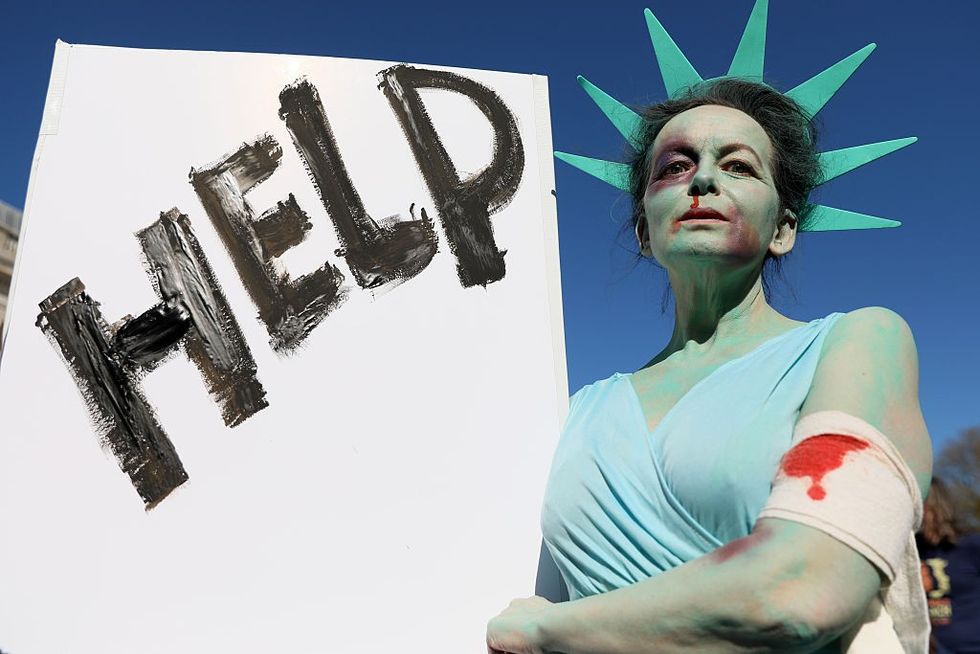


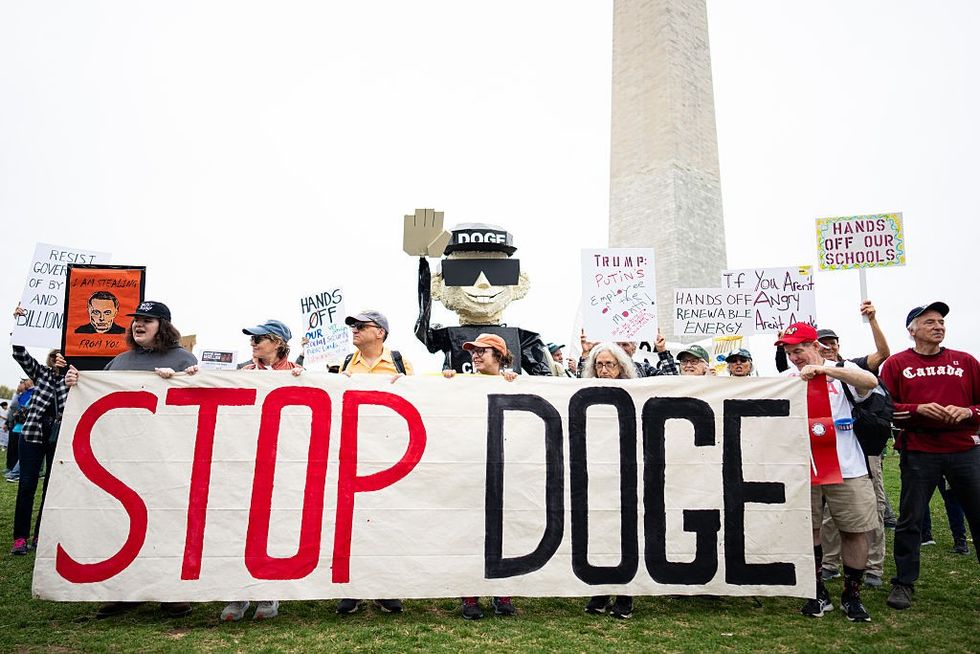



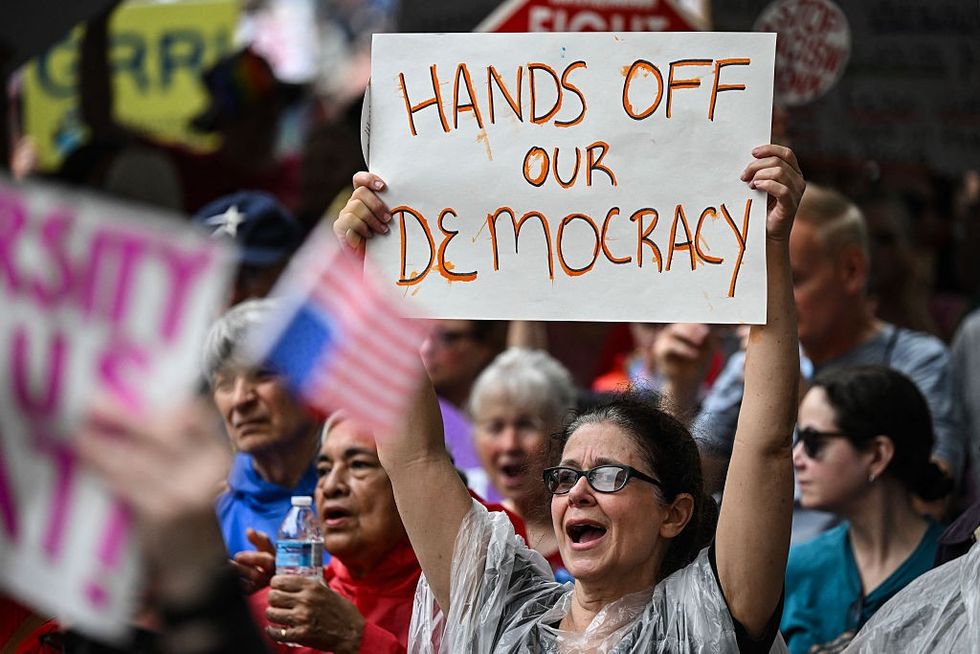
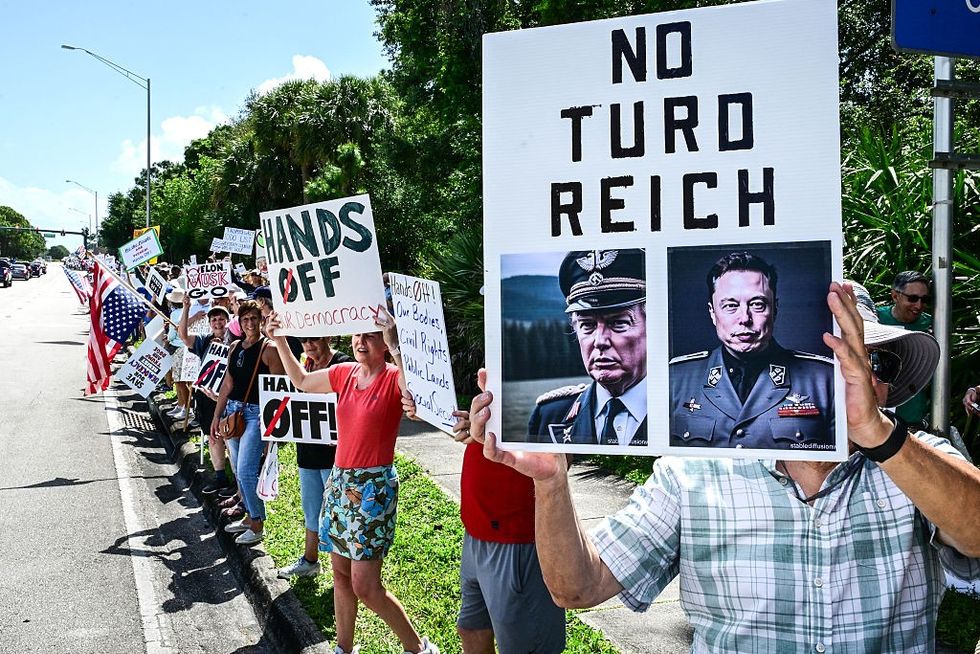


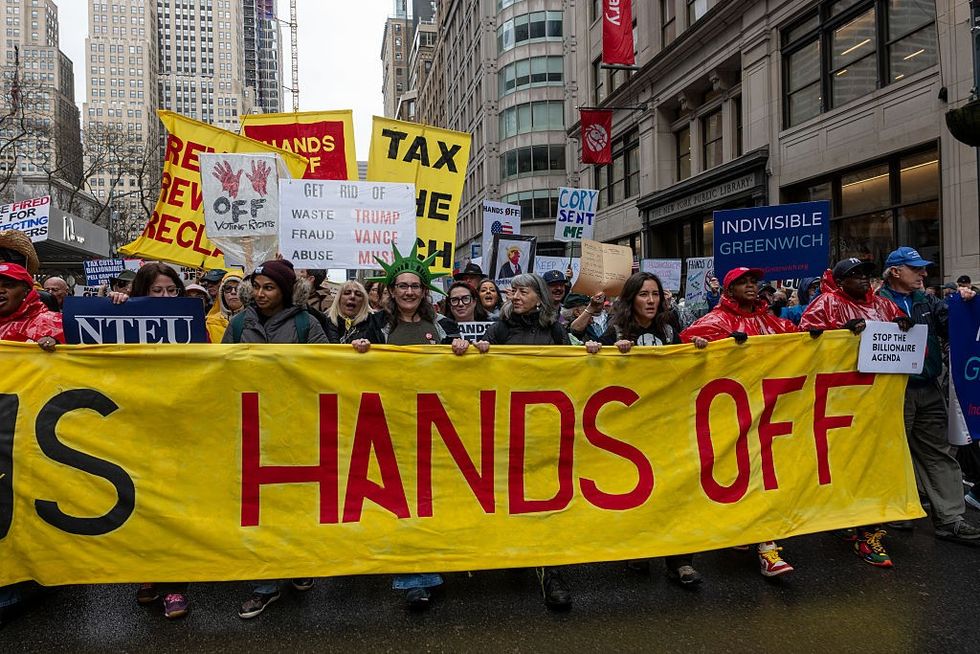



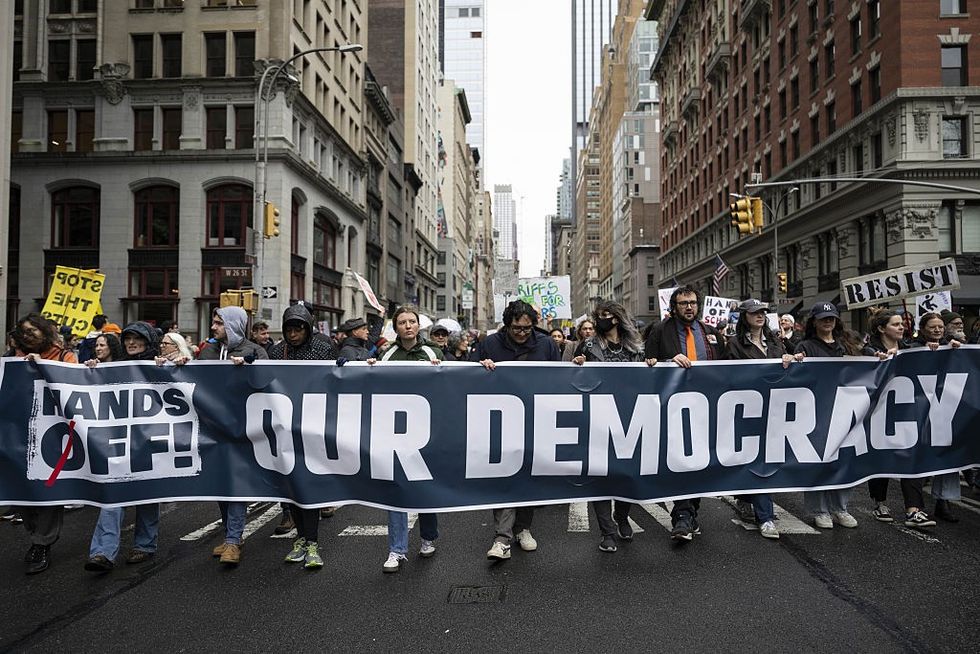


"Everyone involved in this crime against humanity, and everyone who covered it up, would face prosecution in a world that had any shred of dignity left."
A video presented to officials at the United Nations on Friday and first made public Saturday by the New York Times provides more evidence that the recent massacre of Palestinian medics in Gaza did not happen the way Israeli government claimed—the latest in a long line of deception when it comes to violence against civilians that have led to repeated accusations of war crimes.
The video, according to the Palestine Red Crescent Society (PRCS), was found on the phone of a paramedic found in a mass grave with a bullet in his head after being killed, along with seven other medics, by Israeli forces on March 23. The eight medics, buried in the shallow grave with the bodies riddled with bullets, were: Mustafa Khafaja, Ezz El-Din Shaat, Saleh Muammar, Refaat Radwan, Muhammad Bahloul, Ashraf Abu Libda, Muhammad Al-Hila, and Raed Al-Sharif. The video reportedly belonged to Radwan. A ninth medic, identified as Asaad Al-Nasasra, who was at the scene of the massacre, which took place near the southern city of Rafah, is still missing.
The PRCS said it presented the video—which refutes the explanation of the killings offered by Israeli officials—to members of the UN Security Council on Friday.
"They were killed in their uniforms. Driving their clearly marked vehicles. Wearing their gloves. On their way to save lives," Jonathan Whittall, head of the UN's humanitarian affairs office in Palestine, said last week after the bodies were discovered. Some of the victims, according to Gaza officials, were found with handcuffs still on them and appeared to have been shot in the head, execution-style.
The Israeli military initially said its soldiers "did not randomly attack" any ambulances, but rather claimed they fired on "terrorists" who approached them in "suspicious vehicles." Lt. Col. Nadav Shoshani, an IDF spokesperson, said the vehicles that the soldiers opened fire on were driving with their lights off and did not have clearance to be in the area. The video evidence directly contradicts the IDF's version of events.
As the Times reports:
The Times obtained the video from a senior diplomat at the United Nations who asked not to be identified to be able to share sensitive information.
The Times verified the location and timing of the video, which was taken in the southern city of Rafah early on March 23. Filmed from what appears to be the front interior of a moving vehicle, it shows a convoy of ambulances and a fire truck, clearly marked, with headlights and flashing lights turned on, driving south on a road to the north of Rafah in the early morning. The first rays of sun can be seen, and birds are chirping.
In an interview with Drop Site News published Friday, the only known paramedic to survive the attack, Munther Abed, explained that he and his colleagues "were directly and deliberately shot at" by the IDF. "The car is clearly marked with 'Palestinian Red Crescent Society 101.' The car's number was clear and the crews' uniform was clear, so why were we directly shot at? That is the question."
The video's release sparked fresh outrage and demands for accountability on Saturday.
"The IDF denied access to the site for days; they sent in diggers to cover up the massacre and intentionally lied about it," said podcast producer Hamza M. Syed in reaction to the new revelations. "The entire leadership of the Israeli army is implicated in this unconscionable war crime. And they must be prosecuted."
"Everyone involved in this crime against humanity, and everyone who covered it up, would face prosecution in a world that had any shred of dignity left," said journalist Ryan Grim of DropSite News.